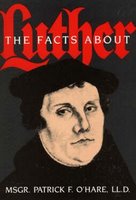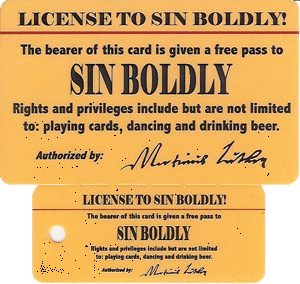 Father O’Hare presents a Luther who is not only mad, but morally depraved and corrupt. He asserts that Luther was in close touch with Satan. He lived indecently, condemned celibacy and virginity, endorsed adultery, dishonored marriage, authorized prostitution and polygamy, was a drunkard and frequenter of taverns, preaching his theology drunk around his fellow Reformation revolutionaries. Luther was a blasphemer, a libertine, a revolutionary, a hater of religious vows, a disgrace to the religious calling, an enemy of domestic felicity, the father of divorce, the advocate of polygamy, and the propagator of immorality and open licentiousness [James Atkinson, Martin Luther Prophet to the Church Catholic (Grand Rapids: Eerdmans, 1983), 4].
Father O’Hare presents a Luther who is not only mad, but morally depraved and corrupt. He asserts that Luther was in close touch with Satan. He lived indecently, condemned celibacy and virginity, endorsed adultery, dishonored marriage, authorized prostitution and polygamy, was a drunkard and frequenter of taverns, preaching his theology drunk around his fellow Reformation revolutionaries. Luther was a blasphemer, a libertine, a revolutionary, a hater of religious vows, a disgrace to the religious calling, an enemy of domestic felicity, the father of divorce, the advocate of polygamy, and the propagator of immorality and open licentiousness [James Atkinson, Martin Luther Prophet to the Church Catholic (Grand Rapids: Eerdmans, 1983), 4]. I've had a fascination with Father Patrick O'Hare's book, The Facts About Luther for quite a few years now. I came across this book via its use in Roman Catholic apologetics. I would visit Roman Catholic websites or discussion boards finding it quoted as a definitive historical reference on Luther.
After reading this book, in 2002 I determined to have a web page resource available documenting the numerous errors and slander found in this book (finally completed July 2003 originally hosted on Eric Svendsen’s NTRmin Website: The Roman Catholic Understanding of Luther (Part One). I arrived at this determination while participating on the CARM discussion boards. A defender of Rome posted a thread entitled, “Luther the "Super-Pope" and Protestant Tradition” (posted November 5, 2002). A quote from Father O’Hare’s book was put forth, and I had had enough of the defenders of Rome referring to this book as if it was somehow a relevant and credible historical source for Luther’s life.
I said to this defender of Rome in part:
That piece of nonsense by Patrick O’Hare has NO footnotes. None. Zip. Nada. How can one interact with him? I don’t have thousands of dollars to track down the out of print secondary sources he cites, nor do I speak German. Maybe I could learn German, but it would still take me half a lifetime to check O’Hare’s work... And you quote him all the time on your web site. This type of secondary source research gets me a little agitated. I want to know what Luther said, and where, and how I as an English speaking person can check the facts. Case in point: I had to contact Concordia Seminary to track down one of the quotes you cite on your web page. You gave no references whatsoever other than a sermon title and a date (and the date, I learned was very disputable). Fact is, the sermon wasn’t even available in English, but yet you had a quote from it in English.…Yes, I was definitely heated up. I had reached a point of frustration with citations from Father Patrick O’Hare. I had become annoyed by the defenders of Rome quoting someone else quoting Martin Luther rather than actually reading and quoting Luther. Kudos’ to this defender of Rome for his response back in 2002:
You should then, be exhorted to perform the apologetic task better. Your website is geared toward laymen. Help us all out a little bit and do primary research. Put the Grisar down and get your hands into the actual texts.
... I might sound a little hostile, but it’s more frustration. I like your website, but your Luther research has puzzled me for a long time. More than one occasion I have spent a an hour or two looking for one of the contexts for your Luther quotes.
“I am fed up with him, too, for the same reason. But in his defense, I believe that when he wrote his work (1915) there was no readily available edition of Luther's works in English (I might be wrong on that). Pelikan was still 40 years away, and even the older set I have (partial set) was 15 years away. So he did a service of providing quotes from Luther himself, at that time…. You'll be pleased to know that I was planning on adbridging some of the old papers on Protestantism and Luther. That was the first research I did upon converting and I think I would do it a bit differently today. And I was gonna change precisely what annoyed you: the O'Hare stuff that only referred to German editions. perhaps I can find some stuff in English from my library.”And then he documented his deletion of Patrick O’Hare quotes:
“#96, O'Hare Purge Now Underway / Lortz as God Posted by ** on Nov-11-02 at 01:56 AM In response to message #78 First paper to undergo severe editing (32K worth!): Martin Luther: Beyond Mythology to Historical Fact Not a single citation from O'Hare remains.
114, O'Hare Purge #2 Posted by ** on Nov-11-02 at 11:53 AMIn response to message #96 THE PROTESTANT REVOLT: Its Pernicious & Tragic Initial Impact Not as much O'Hare in this one, though, to take out.
#119, O'Hare Purge #3 Posted by ** on Nov-11-02 at 12:53 PMIn response to message #114 And this one: The Protestant Inquisition ("Reformation" Intolerance and Persecution)And then there was my interaction with Rome's defender, Dr. Art Sippo. In my discussion with him about O'Hare's book, Dr. Sippo said: “The book needs to be taken with a grain of salt” and “Some of the things it says about Luther are not accurate.” And also, “Fr. O'Hare also imputed to Luther certain base motives that I don't think he had.”
But O’Hare is still quoted as the definitive guide to Luther. For instance, here's an example from Patrick Madrid's Envoy boards:
To which I responded:“For Luther I recommend THE FACTS ABOUT LUTHER by Msgr. Patrick F. O’Hare, LL.D…As an ex-Lutheran the book was more than a little interesting to me. Much of what Msgr. O'Hare writes about Luther are difficult to read. It is well referenced. I looked up much of those references, here in Southern California Concordia University is not far from me. I looked up enough to satisfy myself that the author told the truth….”"Hi Mr. Swan ....I’m an ex-Lutheran (LCMS) and am the one who recommended THE FACTS ABOUT LUTHER. I did think that the book was quite hard on M. L. so I did some checking of the facts. All of the references that I checked turned out to be true. I plan to try to check out Ch.9 It won’t be too difficult as I live not to far from Concordia University in California."
I'm very curious as to how you check O'Hare's "Facts". The reason why, is because checking O'Hare's "Facts" has many obstacles: -Many of O'Hare's citations are incomplete. -Many of O'Hare's citations are missing completely. -Many of O'Hare's citations are references to Luther's Works in German and Latin- and these are often editions which aren't even available in many instances, or even available to the public (some date back to the 16th Century). - None of O'Hare's references are to the standard 55 volume English edition of Luther Works. This set had not been compiled yet at the time he wrote. - Many of O'Hare's secondary sources have the same characteristics of his Luther citations: incomplete, missing, or referring to works not readily available (he cites works from the 1800's, some in non-English languages as well). It can take me hours to check a single O'Hare quote. At present, I have 3 different sets of Luther's Works, and quite a few secondary sources, as well as access to 5 good college libraries. I also have a small collection of the secondary sources O'Hare used. For instance, I recently tracked down a copy of Trevern's Amicable Discussion which O'Hare cites on pages 200-201. How would you check these citations, from O'Hare's book: -Tischereden, Frankfurt, 1567, fol. 314 a; -DeWette, Dr. Martin Luther's Briefe, II Berlin, 1825, 101; -Werke, Weim. Ed. I, 1883, p. 69; -Martin Luther - Wittenb. ed. 2,171.6; -Martin Luther - Jena. ed. 1.318 b; -Walch ed. -Sammtliche Werke [Collected Works], 63, 169-170; -Lauterb. 91; -Advice To All Christians, 1522 -El. ed. 15, 276; -'Schlaginhaufen,' 'Aufzeichnungen,' p. 118; -Alts Aberdmahlsehre, 2, 118. This is just a small sampling of References found in O'Hare's Facts About Luther. Now, I haven't done anything sneaky here like only give the hard ones- no, almost all of O'Hare's citations are similar to these (if he gives them at all).
Now, the discussion never continued after I wrote that. I didn't expect it to. I never heard back from that Roman defender again on Father O'Hare's book. And finally, recently on the CARM boards, a Roman Catholic quoted the following from O’Hare:
So why bring all this up? Since I still come across O’Hare being recommended as the definitive work on Luther, I thought it would be interesting to document some of my interactions with Roman Catholics on this book. See also:
The Facts About Luther (Part One) A quick overview of the worst book on Luther ever written by Father Patrick O’Hare.
The Facts About Luther (Part Two) A brief response to a Roman apologist who felt I did not understand one of Father O'Hare's arguments against Luther, nor did I treat Father O'Hare fairly.
O'Hare's Facts About Luther: Master Index of Outrageous Quotes A list of quotes I’ve either found in cyber-space or my own study of The Facts About Luther. Its one thing to read Luther and critique him- this is perfectly acceptable- and I challenge all to do this. It is quite another thing to read a book that slanders Luther, and then use out of context quotes to prove how awful he was- without ever actually reading a page from Luther's actual writings.
Defending O'Hare's Facts About Luther: A Roman defender attempts to give credence to one of the worst books on Luther ever written.
Defending O'Hare's Facts About Luther (Continued)- A Roman defender gives up defending one of the worst books on Luther ever written.
Roman Apologist Art Sippo on Father O’Hare’s “Facts About Luther”- Catholic apologist Art Sippo says do not read The Facts About Luther.
The great reformer’s new program of salvation in which the living, vital, efficacious faith that manifests itself in good works, and without which it is impossible to please God, must be discarded. All the old teachings, practices and observances of piety, so useful and helpful for man’s justification and his deliverance from divine vengeance, must now be forgotten and abandoned. The priesthood, sacraments, indulgences, intercessory prayer, fasts, pilgrimages, all spiritual works must be displaced to make way for his miserable, degrading, and colorless invention of faith without works." ------Msgr. O'HareThis snippet comes from the top of page 99 in the TAN edition from 1987. The ironic thing is this guy actually mis-quotes O’Hare. O’Hare doesn't say, "...must be discarded"; rather, he says, "and without which it is impossible to please God, must no longer prevail in the minds of men." Well, I challenged this guy also to defend O’Hare’s book. Not a peep of response... I’m the last one left in the room, so I might as well turn the light out and shut the door.
So why bring all this up? Since I still come across O’Hare being recommended as the definitive work on Luther, I thought it would be interesting to document some of my interactions with Roman Catholics on this book. See also:
The Facts About Luther (Part One) A quick overview of the worst book on Luther ever written by Father Patrick O’Hare.
The Facts About Luther (Part Two) A brief response to a Roman apologist who felt I did not understand one of Father O'Hare's arguments against Luther, nor did I treat Father O'Hare fairly.
O'Hare's Facts About Luther: Master Index of Outrageous Quotes A list of quotes I’ve either found in cyber-space or my own study of The Facts About Luther. Its one thing to read Luther and critique him- this is perfectly acceptable- and I challenge all to do this. It is quite another thing to read a book that slanders Luther, and then use out of context quotes to prove how awful he was- without ever actually reading a page from Luther's actual writings.
Defending O'Hare's Facts About Luther: A Roman defender attempts to give credence to one of the worst books on Luther ever written.
Defending O'Hare's Facts About Luther (Continued)- A Roman defender gives up defending one of the worst books on Luther ever written.
Roman Apologist Art Sippo on Father O’Hare’s “Facts About Luther”- Catholic apologist Art Sippo says do not read The Facts About Luther.














